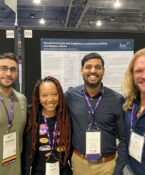Research to make early detection of Alzheimer’s disease more accessible
By combining a simple blood test with a cognitive exam and demographics, researchers at UNT Health Science Center were able to accurately detect Alzheimer’s disease, even in its very early stages.
The research could lead to a rapid, accurate and cost-effective way to screen for Alzheimer’s disease, said Dr. Sid O’Bryant, Interim Director of the Institute for Aging and Alzheimer’s Disease Research and one of four authors of the study in the Journal of Alzheimer’s Disease.
"We’re talking about one finger stick and a short cognitive test," Dr. O’Bryant said. "Every patient 60 and older could get it once a year from their primary care doctor."
For the study, only two blood biomarkers were screened. The Clock Drawing Test, which requires participants to place the hands and numbers on a predetermined time, was used for the cognitive exam.
The combination of tests could make early detection more accessible to the growing population of people at risk for Alzheimer’s disease. Currently 5.2 million people have Alzheimer’s disease, but that number is expected to triple by 2050.
The prevalence of Alzheimer’s disease has led to a heightened interest in finding an accurate tool for early detection. Earlier treatment helps preserve function and leads to better outcomes, Dr. O’Bryant said.
The model could be used to screen for the disease before more expensive, time-consuming and invasive procedures are considered.
"Instead of a comprehensive dementia exam, which takes two hours, this entire process can be done in less than 10 minutes," Dr. O’Bryant said. "Then if you get a positive result, you can do a full blown blood test and brain scan."
It also would make screening available to more people.
"The problem now is there are far more elders who should be screened for cognitive loss than there is capacity," Dr. O’Bryant said. "This is cost effective, time effective, and it won’t over-burden the health care system."
The financial burden for Alzheimer’s disease is estimated at $200 billion but that could reach $1.1 trillion by 2050.
Dr. James Hall, Professor of Psychiatry and Behavioral Health also participated in the research. Melissa Edwards, a PhD student in the psychology department at UNT was lead author on the study.





Social media